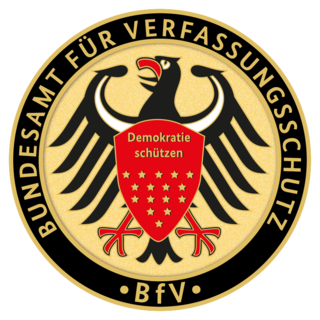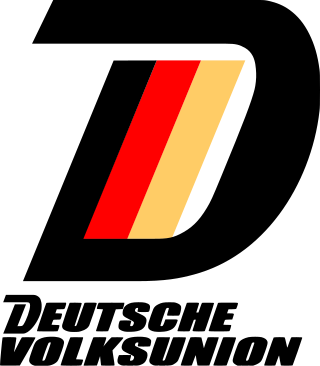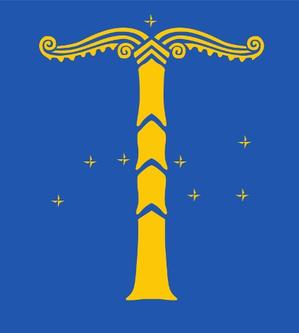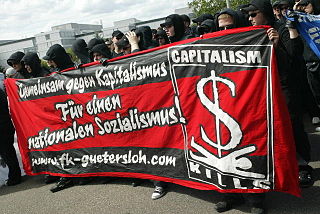Related Research Articles
Führer is a German word meaning "leader" or "guide". As a political title, it is strongly associated with the Nazi dictator Adolf Hitler, who officially styled himself der Führer und Reichskanzler after the death of President Paul von Hindenburg and the subsequent merger of the offices of Reichspräsident and Reichskanzler.

The Federal Office for the Protection of the Constitution is Germany's federal domestic intelligence agency. Together with the Landesämter für Verfassungsschutz (LfV) at the state level, the federal agency is tasked with intelligence-gathering on efforts against the liberal democratic basic order, the existence and security of the federation or one of its states, and the peaceful coexistence of peoples; with counter-intelligence; and with protective security and counter-sabotage. The BfV reports to the Federal Ministry of the Interior and tasks and powers are regulated in the Bundesverfassungsschutzgesetz. The President is Thomas Haldenwang; he was appointed in 2018.

The German People's Union was a political party in Germany. It was founded by publisher Gerhard Frey as an informal association in 1971 and established as a party in 1987. Financially, it was largely dependent on Frey. In 2011, it merged with the National Democratic Party of Germany (NPD).

The Artgemeinschaft Germanic Faith Community is a German Neopagan and Neo-Nazi organization founded in 1951 by Wilhelm Kusserow, a former member of the SS. In 1983, it merged with the Nordungen. From 1989 to 2009, it was headed by Jürgen Rieger.
HIAG was a lobby group and a denialist veterans' organisation founded by former high-ranking Waffen-SS personnel in West Germany in 1951. Its main objective was to achieve legal, economic, and historical rehabilitation of the Waffen-SS.
The Blick nach Rechts is a social democratic German-language information service which appears every two weeks on the Internet. Its concern is the current "information about Far-right activities", which in the opinion of the initiators aren't noticed enough by the German media.

The Ulrichsberg gathering is an Austrian German nationalist organisation founded in Klagenfurt in 1953 to memorialise Carinthian soldiers in World War I, the Austro-Slovene conflict in Carinthia, and World War II. Its full name is Ulrichsberggemeinschaft / Heimkehrer- und Europagedenkstätte : this indicates, first, the annual meeting of war veterans and their families which it organises at Ulrichsberg mountain near Klagenfurt; and, second, the war memorials to returning soldiers which it maintains on the Ulrichsberg and in Klagenfurt. The organisation is considered a meeting ground of far-right extremists and unrepentant Nazis, such as former members of the Waffen-SS.

Autonome Nationalisten are German, British, Dutch and to a lesser degree Flemish Nationalists, who have adopted some of the far-left and Antifa's organizational concepts, demonstration tactics, symbolism, and elements of clothing, including Che Guevara T-shirts and keffiyehs. Similar groups have also appeared in some central and eastern European countries, beginning with Poland, the Czech Republic, Ukraine, Romania and Greece and others.
Anton Maegerle is the Pseudonym of a German journalist. He is also the author of books about far-right politics, right-wing radicalism, the New Right, and right-wing policy in general.
The National-Zeitung was a weekly, extreme right newspaper, published by Gerhard Frey, who also founded the far-right Deutsche Volksunion as an association in 1971, turning it into a political party in 1987. The party was merged with the National Democratic Party of Germany (NPD). NZ was last published in December 2019.

Identitäre Bewegung Österreich is an Austrian far-right nationalist and Neue Rechte organization. Inspired by the French Bloc identitaire, it belongs to the pan-European Identitarian movement and is the Austrian branch of the organization known as Generation Identity (GI).

Franz Kurowski was a German author of fiction and non-fiction who specialised in World War II topics. He is best known for producing apologist, revisionist and semi-fictional works on the history of the war, including the popular English-language series Panzer Aces and Infantry Aces.
Far-right subcultures refers to the symbolism, ideology and traits that hold relevance to various politically extreme right-wing groups and organisations. There are three kinds of subcultures within far-right movements to distinguish: subcultural parasitism, subcultural creation around ideology and subcultures that are networking with far-right movements, as some football hooligans did with neo-nazis.
Arndt Verlag is a German publishing house that belongs to the publishing group of the neo-Nazi publisher Dietmar Munier. It specialises in historical negationist literature. Arndt's authors include David Irving, Wilfred von Oven, Franz Kurowski and Franz W. Seidler.
Waffen-SS veterans in post-war Germany played a large role, through publications and political pressure, in the efforts to rehabilitate the reputation of the Waffen-SS, which had committed many war crimes during World War II. High ranking German politicians courted former Waffen-SS members and their veteran organisation, HIAG. A small number of veterans, somewhat controversially, served in the new German armed forces, the Bundeswehr.
The liberal democratic basic order is a fundamental term in German constitutional law. It determines the unalienable, invariable core structure of the German commonwealth. As such, it is the core substance of the German constitution. Building upon more general definitions of liberal democracy, the term has a specific legal meaning in Germany and is part of the German system of a Streitbare Demokratie that bans attempts to dismantle the liberal democratic basic order by what German authorities refer to as "enemies of the Constitution" or "extremists". In practice the concept has been used to target far-left and far-right groups and in the ideological struggle against East German communism during the Cold War; during the Cold War the concept was closely linked to the state doctrine of anti-communism in West Germany. Theoretically the concept is associated with anti-totalitarianism and with the scholarly field of democracy and extremism research in Germany. While often relying upon scholars in this field, the decision that a group threatens the liberal democratic basic order is ultimately a political decision that is the responsibility of the interior minister at the state or federal level, or, in the case of a ban, a legal decision that is decided by the judiciary.
Antifa is a political movement in Germany composed of multiple far-left, autonomous, militant groups and individuals who describe themselves as anti-fascist. According to the German Federal Office for the Protection of the Constitution and the Federal Agency for Civic Education, the use of the epithet fascist against opponents and the view of capitalism as a form of fascism are central to the movement. The antifa movement has existed in different eras and incarnations, dating back to Antifaschistische Aktion, from which the moniker antifa came. It was set up by the then-Stalinist Communist Party of Germany (KPD) during the late history of the Weimar Republic. After the forced dissolution in the wake of Machtergreifung in 1933, the movement went underground. In the postwar era, Antifaschistische Aktion inspired a variety of different movements, groups and individuals in Germany as well as other countries which widely adopted variants of its aesthetics and some of its tactics. Known as the wider antifa movement, the contemporary antifa groups have no direct organisational connection to Antifaschistische Aktion.

Der Flügel is a far-right faction within Germany's Alternative for Germany, a right-wing populist opposition party. The group was led by Björn Höcke and Andreas Kalbitz. Approximately 20 percent of AfD members are organized also in the "Flügel". Following the request by the AfD executive board to dissolve Der Flügel by the end of April 2020, the group's online presence went offline. The Office for the Protection of the Constitution has no reliable knowledge of an actual dissolution. Within the party, the Flügel now calls itself the "social-patriotic faction".
Armin Pfahl-Traughber is a German political scientist, sociologist and government official. He is professor of political science at the Federal University of Applied Administrative Sciences in Germany and is a former director of the office for far-right extremism in the Federal Office for the Protection of the Constitution. He is an expert on far-right and far-left political extremism, terrorism, anti-semitism and the history of ideas. He is editor of the Jahrbuch für Extremismus- und Terrorismusforschung.
References
- ↑ Stöss, Richard (12 September 2006). "Geschichte des Rechtsextremismus" [History of the far-right]. Federal Agency for Civic Education (in German). Retrieved 1 December 2018.
- ↑ Hoser, Paul. "Rechtsextremismus" [The Far-right]. Historisches Lexikon Bayerns (in German). Retrieved 1 December 2018.
- ↑ Wagner, Bernd (2 January 2018). "Vertuschte Gefahr: Die Stasi & Neonazis" [Hidden danger: The Stasi and Neo-Nazis]. Federal Agency for Civic Education (in German). Retrieved 1 December 2018.
- ↑ "Rechtsextremismus" [The Far-right]. Federal Office for the Protection of the Constitution (in German). Retrieved 30 November 2018.
- 1 2 Pfeiffer, Thomas (19 December 2016). "Das Kapillarsystem – Geschichte und Entwicklung der rechtsextremistischen Presse" [History and development of the far-right press]. Federal Agency for Civic Education (in German). Retrieved 1 December 2018.
- ↑ "Rechtsextremistische Parteien" [Far-right Parties]. Federal Office for the Protection of the Constitution (in German). Retrieved 30 November 2018.
- 1 2 3 4 5 Nandlinger, Gabriele (25 May 2007). "Rechtsextreme Schwarz-Weiß-Malerei - Ein kurzer Überblick über die tonangebenden rechtsextremen Printmedien" [Far-right black & white vision: A short overview of the major far-right print medias]. Federal Agency for Civic Education (in German). Retrieved 30 November 2018.
- ↑ Carla Bleiker (3 December 2018). "Publishing house terminates German pulp mag 'Der Landser'". Deutsche Welle. Retrieved 14 April 2015.
- 1 2 3 4 Maegerle, Anton (23 December 2016). "Was liest der rechte Rand? Der Blätterwald" [What does the right edge read? Publications]. Federal Agency for Civic Education (in German). Retrieved 30 November 2018.
- ↑ Speit, Andreas (27 March 2014). "Neues von der Waffen-SS" [New stuff from the Waffen-SS]. Die Tageszeitung (in German). Berlin . Retrieved 30 November 2018.
- ↑ "Der Freiwillige". German National Library (in German). Retrieved 30 November 2018.
- ↑ "Rechtsextremismus: Verlage und Versandhandel" [The Far-right: Publishers and mail order businesses]. Bavarian Office for the Protection of the Constitution (in German). Retrieved 17 November 2018.
- 1 2 "New German magazine puts gloss on far-right, say critics". The Guardian . 8 January 2010. Retrieved 30 November 2018.